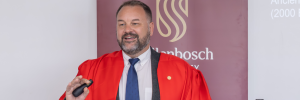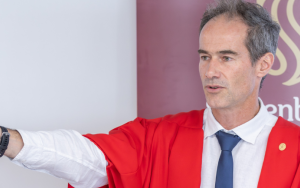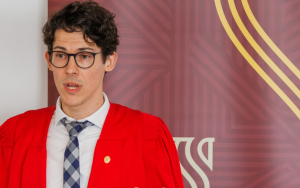
Prof Arnold Rix delivers his inaugural lecture.
Prof Arnold Rix advances renewable energy technologies for a low-carbon future
- Prof Arnold Rix from the Department of Electrical and Electronic Engineering delivered his inaugural lecture on Thursday 6 November 2025.
- He enhances the performance, reliability, and sustainability of renewable energy systems.
- His work supports South Africa’s transition to a low-carbon future.
Prof Arnold Rix from the Department of Electrical and Electronic Engineering in the Faculty of Engineering at Stellenbosch University delivered his inaugural lecture on Thursday 6 November 2025. The title of his lecture was ‘Creating stability through disruption with renewable energy: from challenges to opportunities’.
Rix, who also holds the Scatec Chair in Renewable Systems, spoke to the Corporate Communication and Marketing Division about his efforts to enhance the performance, reliability, and sustainability of renewable energy systems to support South Africa’s transition to a low-carbon future.
Tell us more about your research and why you became interested in this specific field.
My research focuses on advancing renewable energy technologies and their integration into modern power systems, with a strong emphasis on solar photovoltaic (PV) and wind energy. My interest in this field developed naturally from my years working in the renewable energy industry, where I was involved in the design, development, and grid integration of large-scale solar and wind projects. This experience inspired me to explore deeper technical and systemic challenges through research. At Stellenbosch University, I established a research group that bridges modelling, field experimentation, and system-level integration – focusing on PV performance and degradation analysis, forecasting, hybrid storage optimisation, and frequency stability in low-inertia grids (electricity systems with little built-in stability). Through this work, I aim to enhance the performance, reliability, and sustainability of renewable energy systems to support South Africa’s transition to a low-carbon future.
How would you describe the relevance of your work?
The relevance lies in addressing the practical and technical challenges of integrating renewable energy into real-world power systems. Through the Scatec Chair in Renewable Systems, my research maintains a strong link to industry needs, ensuring that our work directly contributes to improving the design, operation, and reliability of large-scale renewable energy projects. Collaborating with Scatec provides invaluable insight into the evolving energy landscape, enabling us to develop solutions that enhance PV system performance, forecasting accuracy, and grid stability. By combining academic research with industrial application, our work supports South Africa’s and the broader region’s transition to a resilient, low-carbon energy future.
Can you give examples of how your research is applied in real-world contexts?
It is applied in several real-world contexts through direct collaboration with industry and government partners. For example, our work with Scatec supports the optimisation of large-scale PV plant design, performance assessment, and degradation analysis, ensuring more reliable long-term operation. We have developed forecasting and modelling tools that assist utilities and system operators in planning for higher renewable energy penetration and grid stability. In addition, projects such as the electrification of paratransit (informal, semi-regulated public transport) using solar-powered charging infrastructure demonstrate how our work extends beyond traditional generation to support sustainable transport solutions in Africa. Through these applications, our research contributes directly to improving energy access, system reliability, and the overall sustainability of renewable energy deployment.
What are South Africa’s main renewable-energy challenges, and how can they be addressed?
South Africa’s main renewable energy challenges include grid instability, limited storage capacity, slow infrastructure expansion and regulatory uncertainty that hinders large-scale integration. While the country has excellent solar and wind resources, the variability of these sources places pressure on an already constrained grid. To address these issues, we need a coordinated approach that combines improved forecasting, better grid management, and investment in flexible generation and storage solutions. My research contributes to this by developing advanced PV and wind performance models, conducting grid stability analyses, and designing hybrid energy systems that enable higher renewable penetration without compromising reliability. Strengthening partnerships between academia, industry, and policymakers, such as through the Scatec Chair in Renewable Systems, can accelerate innovation and ensure that research outcomes are translated into practical, scalable solutions for South Africa’s evolving energy landscape.
How does your work advance technologies that support the shift to cleaner, more efficient energy systems?
It advances cleaner, more efficient energy systems by developing technologies and models that enhance the performance, reliability, and integration of renewable energy sources. Through the Scatec Chair in Renewable Systems, my group focuses on solving real-world challenges in solar PV, wind, and hybrid energy systems. We develop advanced models for PV degradation, forecasting, and spectral correction to improve energy yield predictions and system optimisation. Our research on inverter-based grid stability and hybrid storage enhances the flexibility and resilience of power systems rich in renewables. In collaboration with industry partners, we turn these innovations into practical solutions that directly support South Africa’s transition to a sustainable, low-carbon energy future.
Looking into your crystal ball, what developments do you see in renewable energy?
In the coming years, I expect renewable energy to become far more integrated, intelligent and decentralised. Advances in digital technologies such as AI-driven forecasting, real-time system optimisation and predictive maintenance will make renewable systems more efficient and resilient. Hybrid solutions that combine solar, wind, and storage will increasingly dominate, supported by innovations in battery chemistry and grid-interactive inverters (smart inverters that interact with the electricity grid). In South Africa, the shift toward distributed generation and local microgrids will help improve energy access and reliability. I also foresee strong growth in the coupling of renewables with green hydrogen and electric mobility, enabling deeper decarbonisation across multiple sectors. The continued collaboration between academia, industry and government will be essential to realise this future and ensure that renewable energy becomes the backbone of a sustainable and inclusive energy system.
The higher education environment can be challenging. What keeps you motivated when things get tough?
Seeing the tangible impact of my work on both students and the renewable energy industry. Guiding students as they develop into confident engineers and researchers gives me a deep sense of purpose, especially when their projects lead to real-world applications or industry adoption. The collaborative nature of my work, supported by partnerships such as the Scatec Chair in Renewable Systems, continually reinforces the relevance of our efforts. Even when challenges arise in the higher education environment, the opportunity to contribute to South Africa’s energy transition and to shape the next generation of problem-solvers reminds me why this work truly matters.
Tell us something exciting about yourself that people would not expect.
I’m an avid long-range target shooter. The sport demands precision, patience and a deep understanding of environmental factors, qualities closely aligned with those needed in engineering research. It serves as both a mental reset and a discipline that sharpens my focus, helping me approach complex technical challenges with calm and clarity.
How do you spend your free time?
I enjoy long-range target shooting, which helps me stay focused and disciplined. I am married and a father of three successful children who all enjoy sports, so when I am not on the range, I spend most weekends next to the sports field supporting them. My wife and I share a love for photography, and capturing those moments together has become one of our favourite hobbies. It is a rewarding way to balance family life, sport and creativity.



